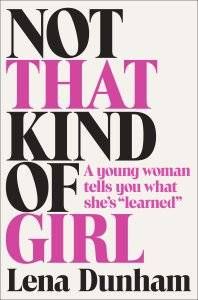
On Lena Dunham and Not Caring About Being “Literary”

I admit, I was a little embarrassed at first. The residual lit snobbery from my writing program was rearing its ugly head. But I wanted to give her a chance. She’s a good screenwriter, and I wanted to read what she had to say. While I may not be a fan, I admire the way she puts herself out there, both physically and otherwise. And as a fellow young woman making her way in the world, more of us need to be heard.
She’s good at screenwriting, but as a memoirist, not so much. At least in my opinion. I couldn’t even get through half the book. Did I marvel at the guts she had to write embarrassing and not always favorable things about herself? Yes. Did I cringe in recognition at her tales of being that awkward girl? Of course. The book just wasn’t my thing. But what irritated me was the slamming of Dunham on Facebook about her “literary” merit, or lack thereof.
Let me be honest: I’m tired of the “literary or not literary” debate. I don’t know if that exists outside the MFA world, but it often feels like it’s rampant. Because, of course, you would never want to be anything but “literary.” Commercial fiction is the kiss of death, the writing-that-shall-not-be-named. So who’s defining “literary,” anyway? Those in power? The works of the literary canon, mostly dead white men? Those writing up the rarified Times Best Seller Lists or The New Yorker book reviews?
I was embarrassed when I saw a former professor of mine disparage Dunham about not being literary. Not embarrassed for me, but for her. Though I didn’t think the writing was spectacular, there’s a difference between thinking the writing was not that great, and something being not literary (whatever that even means anymore). Case in point, in one of my classes, we read through a list of “literary works” one semester. Did I think some of that writing was terrible? You bet. (Do I even have to specify that the list was all men – mostly white – except for Joan Didion and Virginia Woolf, who were lumped together in a single class?). But these were “literary” books. This was the canon.
I’m definitely not comparing Dunham to Tolstoy, Woolf, or any other author. I’m just tired of writing and writers being cattily torn down as not being literary, aka, worthy. Take Stephen King, for example. I’ve heard him being classified as not literary, or a “guilty pleasure.” Have you read On Writing? One of the best damn books out there on writing and being a writer. And he’s not literary, because of what kind of books he writes?
When I realized the reaction I had at comments about Dunham’s book, I felt bad about being embarrassed when I bought it. Who was I to judge her, before I read her book? Why was I so embarrassed? Because it wasn’t as taxing as To the Lighthouse? Get over yourself, Jaime. It was one of those Captain Obvious moments for me. Have I read the Gossip Girl series? You bet. And I loved it. I read some of the Pretty Little Liars series, too. Is my MFA going to be taken away? My bookshelves hold an array of books, from YA to poetry, to fiction and memoir, from all kinds of writers, many of whom might not be “literary.” But these books are the ones that have made the most impression on me, they are the books I return to again and again for inspiration and comfort. The courage and beauty on these pages can take my breath away.
So when I’m at the bookstore, in the stack of books I carry, I may have Plath, Woolf, Kerouac, Eileen Myles, Francesca Lia Block, Judy Blume (most likely a Superfudge book), or Douglas Adams. I read middle grade, classics, and everything in between. I’m going to stop referring to some books as “brain candy.” I’m going to stop sheepishly admitting to liking some books, and instead, be proud that I like them. There are no more books I “should” or “shouldn’t” be reading. I’m breaking free from caring whether something is “literary” or not.
Because I am just that kind of girl.














